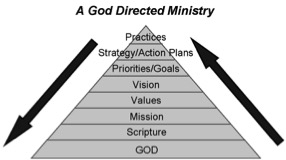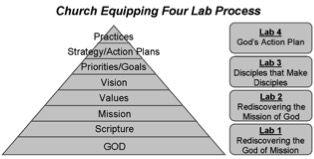 by Jay Jarboe
by Jay Jarboe
In the last article, we discussed the importance of having a “God-Directed Ministry.”
 In an effort to help churches do this, Mission Resource Network (MRN) has developed a series of equipping labs and processes, which we conduct with both domestic and foreign congregations. One of the tools we provide church leaders is a diagram, entitled “Developing a God-Directed Ministry.” This tool serves as a “track for churches to run on” in their quest to empower a new vision.
In an effort to help churches do this, Mission Resource Network (MRN) has developed a series of equipping labs and processes, which we conduct with both domestic and foreign congregations. One of the tools we provide church leaders is a diagram, entitled “Developing a God-Directed Ministry.” This tool serves as a “track for churches to run on” in their quest to empower a new vision.
Each lab experience seeks to help churches work through the pyramid of “A God-Directed Ministry.” Four steps become important in this missional church-equipping process:
1. Rediscovering the God of Mission.
Churches must begin by reconnecting with the nature and identity of the God of mission. We must all rediscover our identity, which is rooted firmly in the nature of God. The first lab experience is designed to initiate discovery Bible study, conversations, and dialogue as a church re-encounters the word of God. Churches must help their members get reconnected to God’s word in a way that equips them to develop a lifestyle of hearing God and obeying him. The end result is a clearer community understanding of the nature of God, his mission, and how he shapes our purpose as disciples and as a community of followers of Jesus.

This church-equipping process becomes a series of lab experiences, which guides them to discern God and his call for their church. The process helps them build a strong foundation in the God of Mission and the Mission of God, which will shape their practices and their future.
2. Rediscovering the Mission of God.
What is our mission as “followers of Jesus”? Our specific vision and purpose determine our activity and direction as disciples and as a church on mission. The second lab experience focuses us on the life and model of Jesus. We must “fix our eyes on Jesus” and explore how his example determines our vision and lifestyle as a church and as disciples living in a changing and challenging world.
The process of discovery Bible study continues as the church focuses on the incarnation, crucifixion, and resurrection of Jesus and the implication on our quest to follow in his steps. Churches need to rediscover the true good news message of Jesus that they are to live and to proclaim.
A value-clarification process is facilitated, which empowers the leadership to discuss the core values that describe their church. They sort out the core convictions, which shape their identity and help these leaders focus their energy on those things that are most important. These core values will lead them to a clear vision of what God has called them to be and to do in their community and their world. God does give us a compelling vision of what we are to become.
3. Being Disciples and Making Disciples.
As churches begin to reshape their vision, they begin to engage their world by finding ways to be “salt and light” for Jesus. They begin to see that being a disciple in their community takes a different mindset than just “inviting people to church.” The word discipleship is one of those words that we throw around when we want to get people “totally committed.” However, it is a good biblical word that simply describes the life of a follower of Christ, those who are “fixing their eyes on Jesus” and seeking to imitate him in this world. This lab experience focuses the church on the life and characteristics of followers of Jesus.
What are the qualities of a disciple as defined by Jesus? What are the steps we each can take to live as a disciple of Jesus? How can we as a church “be Jesus” to our community and to our world? As a church clarifies its mission, vision, and values, it is then able to focus on goals, strategies, and action steps that empower the living out of those core values as growing disciples of Christ.
4. Living on Mission.
How many times have churches had good intentions, only to see them unfulfilled and forgotten? Churches often lack the accountability and the processes through which they can follow up on their good intentions. Lord willing, through this process, a church will be able to rediscover the nature of God and see that our role and identity in his kingdom is rooted in our Lord who is on mission. Members have seen that returning to the word of God (listening to and obeying his will) is the first step in being a follower of Jesus.
Together, the church has been able to capture an inspiring vision for its future, to identify and clarify its mission and core values as well as to discern a clear vision. It has started the process of setting goals, priorities, and action steps, which will empower them to live on mission with God as a church and as families and as individuals. Churches must now continue to listen to and to obey God as they follow him into his mission.
 We are living in exciting times for God’s global mission. The good news is that God has been working in, around, and through us in the last century in ways that have created a new reality. The challenge is that church must adapt this new reality. We must wake up to the fact that we are missionaries at home in North America and it is time we think like we are!
We are living in exciting times for God’s global mission. The good news is that God has been working in, around, and through us in the last century in ways that have created a new reality. The challenge is that church must adapt this new reality. We must wake up to the fact that we are missionaries at home in North America and it is time we think like we are!
Our role is now that of servants who join what God is already doing. Churches have an exciting opportunity in this new day in missions, to go on a journey with God to allow his nature to shape us once again into a church that is being “salt and light” giving glory to our Father in heaven!

Leave a Reply